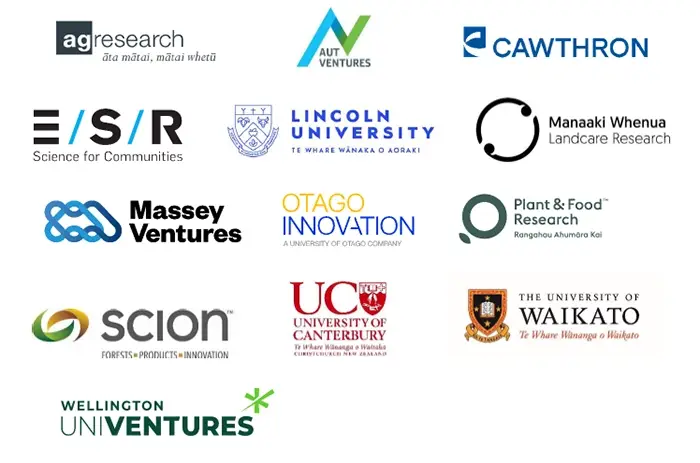A shared vision for the future
Hamilton NZ, 15 July 2025

Unlocking world-changing innovation from New Zealand research
We believe in a New Zealand that backs ambitious innovation – enabling our world-class research to have world-changing impact.
KiwiNet was founded in 2011 as a partnership between research organisations to share knowledge, resources, and networks to scale commercialisation and fast-track scientific breakthroughs to market. Its roots trace back to the formation of UniCom in 2008 – a consortium of four university tech transfer offices (TTOs) who began pooling PreSeed Accelerator Funding (PSAF) and demonstrated how working together created greater commercial outcomes for New Zealand.
Since then, KiwiNet shareholders and pooling partners have delivered returns nearly ten times greater than the PreSeed invested, generating 600+ commercial deals, 1,100+ patents, 88 start-ups, 780+ jobs and more than $640m in known revenue.
Today, KiwiNet unites 19 universities and research institutions – representing 80% of Aotearoa’s publicly funded researchers – in an internationally recognised and successful collaborative model. Its strength lies in balancing unity with autonomy: the model enables the individuality of its members while maintaining interconnectedness across the system. Most organisations participate through the pooled PSAF fund, while others operate their own devolved funds – yet all remain active and aligned to the broader collaboration.
The KiwiNet model has been invaluable in strengthening the expertise, entrepreneurship capability, and profile of the research commercialisation sector. The idea that we are stronger together remains true today.
As a nation, collaboration is our competitive edge. We believe that a future research commercialisation system must build upon this cooperative culture and its success, while addressing systemic challenges.
Our vision for the future
New Zealand as a world-class innovation powerhouse, where research commercialisation transforms bold ideas into game-changing solutions – driving economic growth, boosting productivity, improving lives, and shaping a brighter future.
Three key principles
We agree on these key principles for commercialisation in New Zealand, now and into the future:
-
Collaboration: The key to a thriving innovation ecosystem
New Zealand’s geographical spread and distributed science, innovation and technology system mean that working together isn’t just beneficial – it’s essential. By bringing together research organisations from across the country, we create a connected, equitable, high-performing commercialisation ecosystem that delivers more impact than any organisation could alone. The collaborative culture within the KiwiNet consortium allows us to create critical mass and scale by:
- Reviewing and discussing projects via the KiwiNet Investment Committee (IC) in a transparent, inclusive and mutually supportive process with strong governance, and overseeing the deployment of a shared PreSeed Accelerator Fund.
- Addressing common challenges and leveraging opportunities as a commercialisation community, while remaining flexible to individual needs.
- Ensuring the effective and cost-efficient use of resources that would otherwise be siloed within individual organisations. Learning best practices together builds capability and accelerates speed to market while optimising scarce resources.
- Leveraging unique skillsets across the network.
Over 1,000 projects have engaged with KiwiNet Investment Committees since inception, benefiting from the collective expertise and collaborative support of the KiwiNet network. With a combined and broad view of the local and international market, we can identify future trends, find opportunities for convergence of technologies, and strengthen connections to overseas markets for further innovation and investment.
-
Commercialisation expertise is critical: Skilled professionals turn science discoveries into success
Turning cutting-edge research into commercial success requires specialised expertise. Commercialisation professionals are multi-disciplinary experts, often with scientific backgrounds, bringing knowledge of research, investment, and commercial acumen with the ability to work with a unique stakeholder set.
Technology transfer offices (TTOs) in universities and research institutes play a vital role. It is here that commercialisation and IP professionals bridge the gap between research and real-world application. They identify commercial opportunities, protect and manage IP, connect researchers with industry and investors, and navigate the complexities of licensing, spinouts, and funding.
However, TTOs are vulnerable to funding fluctuations from their parent institutions, impacting successful commercialisation outcomes, where many technologies require multi-year support. At the same time, not all research institutes have the internal capabilities or capacity needed to successfully commercialise their research, and at scale. A model that supports the development of these specialist skills, and provides additional resources to these organisations, is a crucial element for future success.
Regardless of how a national IP policy is implemented, this specialist workforce will remain essential. TTOs need stable, sustainable funding – independent of shifting institutional priorities – or New Zealand risks losing critical expertise and its ability to capture maximum value from innovation.
-
Scaling success requires investment: Now is the time to expand proven high-impact programmes
The KiwiNet investment committee model overseeing the deployment of a shared PreSeed Accelerator Fund has proven highly effective, ensuring each institution has access to the funding, expertise and external experience they need to progress commercialisation opportunities, including bigger projects when they arise.
At the same time, there is a growing entrepreneurial culture across the researcher community, as evidenced by the increasing number of researchers participating in commercialisation and a rising demand for the KiwiNet Emerging Innovator Programme. Over 170 researchers have now been supported through this programme, leading to the formation of at least 24 new deep-tech spin-out companies that have secured over $46M in follow-on investment. This programme is supporting commercialisation teams within the consortium to build an entrepreneurial culture within their institutions while driving growth in the commercialisation pipeline. By expanding a suite of researcher entrepreneurship and commercialisation training programmes, we can further strengthen the innovation pipeline.
The success of initiatives across the ecosystem to build capability and drive technology transfer into market have demonstrated that momentum builds momentum. Now is the time to invest further in these types of programmes to capitalise on the opportunities racing to the surface.
Key opportunities for future success
To deliver our vision for the future, we believe these key challenges in the system must be addressed:
-
Institutional capability and funding stability
Technology transfer offices (TTOs) are vital for connecting research with industry and investment, yet many are under-resourced. Funding for TTOs is often tied to the shifting priorities of parent institutions, leading to instability and workforce attrition. A shrinking commercialisation workforce and inconsistent institutional business models (e.g. cost centre vs. profit centre) undermine the long-term development of commercialisation capability and impact.
-
Incentivising researchers and empowering founders
As the system evolves – including potential shifts in IP policy that further empower researchers to lead – we need a consistent, transparent approach to incentivising researcher-founders and supporting them throughout the commercialisation journey. There is also a need to establish a shared landing zone of principles and parameters for spin-outs or licensing – one that aligns the interests of institutions, researcher-founders, business, and investors. At present, misaligned expectations around roles, incentives, and returns can create friction, slow down negotiations, and risk losing momentum on promising opportunities. To drive better outcomes, the system must celebrate and reward commercial success and support academic entrepreneurship in all forms.
-
Gaps in the commercialisation ecosystem
New Zealand’s commercialisation system lacks sufficient investment to fully support the journey from discovery to impact. Currently, less than 1% of public research funding goes toward commercialisation. In addition, the local early-stage investment market remains shallow, and international access is difficult without dedicated support. Fragmentation across the system further impedes coordinated progress.
Working together on the solution
The KiwiNet consortium of organisations is committed to working collaboratively with the wider science, innovation, and technology community to co-design effective solutions to these challenges and inform the future of New Zealand’s research commercialisation system.
Our consortium holds the lived experience of what works – and what doesn’t – within the current system. We bring decades of collective knowledge, practical expertise, and deep-rooted relationships with researchers, industry, and investors. We also maintain direct connections with leading international experts who have successfully built and refined commercialisation ecosystems around the world.
The solution starts here – with the people and organisations already doing the work.
We stand ready to contribute that experience, insight, and energy to build a stronger, more impactful commercialisation system for Aotearoa.
This statement is endorsed by the following KiwiNet shareholders:
About KiwiNet
KiwiNet brings New Zealand’s commercialisation sector together to accelerate public research to market, driving breakthrough innovation, investment, and proven impact for New Zealand.
To date, KiwiNet’s partner network has harnessed $66M of MBIE PreSeed Accelerator Funding to create 88 start-up companies and generate 788 employment opportunities. Our PreSeed projects since 2003 have created over $646M in known revenue to NZ.
*KiwiNet is made up of 15 shareholder organisations and 4 pooling partner organisations from New Zealand’s universities, public research organisations, and other research organisations, currently representing 80% of New Zealand’s public research. KiwiNet’s shareholder organisations were consulted in developing and endorsing this shared vision statement.

